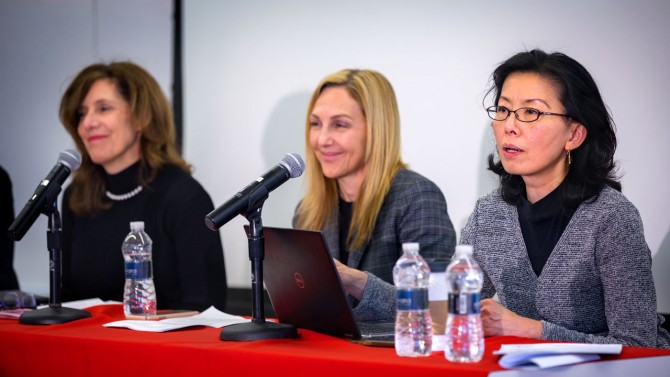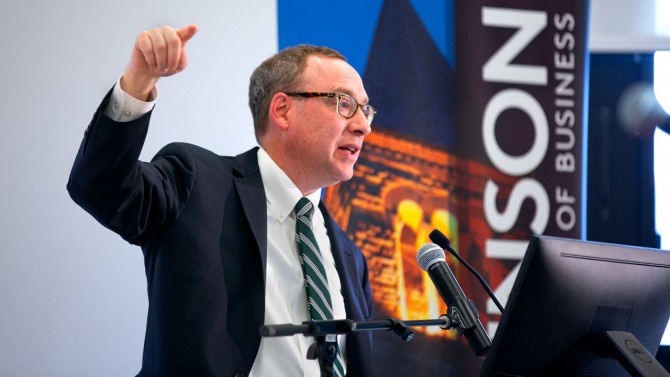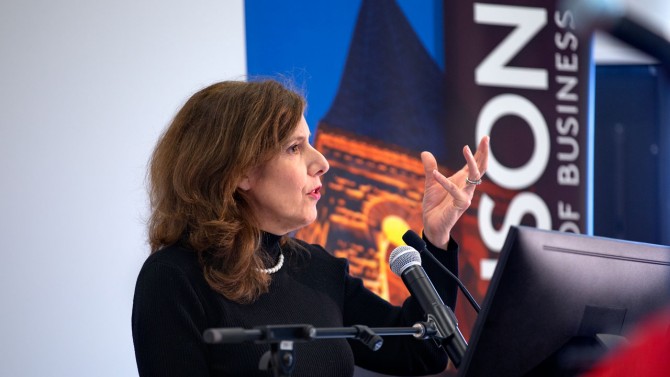Living in an age of inequality: perspectives from the business world
By Susan Kelley
At a recent panel on business, technology and inequality, moderator Ravi Kanbur posed a simple question: Are we living in an age of rising inequality?
That prompted a resounding “yes” and a multilayered discussion from Kanbur and four other faculty members from the Cornell SC Johnson College of Business. They offered perspectives on business in the age of rising inequality during a discussion March 18 in Warren Hall.
“Inequality is a dominant issue of our time, no question about it,” said Kanbur, the T.H. Lee Professor of World Affairs, who organized the event. “Our college of business has skills and perspectives that can address this issue directly.”
While many countries have been experiencing rising inequality, others – such as those in Latin America and parts of Africa and Asia – have not, Kanbur said. Nonetheless, he said, technology is pulling countries decisively toward inequality. “That, to me, is a fundamental force driving inequality,” he said.
Government policy can sometimes counter that force. But globalization, the movement of capital, and taxation competition mean “the capacity of governments to address these issues is less than it was 35, 40 years ago,” he said.
Nancy Chau, professor of applied economics and management in the Dyson School, said technology now allows companies to replace workers with white-collar robots in finance and other fields, and with “telemigrants” who work remotely from other countries. This can potentially have very nuanced influences on the balance of power in the labor market between employers and labor unions.
Policymakers are debating whether there should be limits on the expansive extent to which businesses now control workplace technology. “What should be the basic criteria that guide these decisions?” Chau asked. “Should it be to protect workers or … the public at large?”
Two alternatives to combat inequality, she said, are universal basic income and “flexicurity,” a combination of labor market flexibility policies and a guarantee giving workers access to training programs in the event of unemployment.
Kevin F. Hallock, of the SC Johnson College, said the median level of income in the U.S. has increased modestly in the past 40 years, while people in the 90th percentile of the income distribution have been earning dramatically more.
“It’s not just that the bottom has been flat, but the middle in the U.S. in compensation has been flat for my lifetime,” Hallock said. “It’s only the top quarter that’s pulling away very quickly. And it’s unabated. It just keeps going.”
Although companies must now disclose the ratio of CEO compensation relative to the median employee’s compensation, it hasn’t prompted the expected public backlash or shareholder outcry. “Maybe that’s because many of these companies have done relatively well,” he said.
Kate Walsh, MPS ’90, dean of the School of Hotel Administration, talked about inequality in the hospitality industry, focusing on housekeepers as an example. “We can’t fill these positions quickly enough,” she said. But it’s complicated because the big brands are not the hotel owners, and it’s a business that has low profit margins, she said.
The big five hotel chains are prioritizing other important aspects of working in hospitality, such as employee security. By 2020, their housekeepers will have panic buttons and these companies will have increased policies, training and resources aimed at hotel safety, including preventing and responding to harassment and assault, she said.
In addition, women comprise the largest portion of employees earning a living wage or below. The industry can and must do more to support women, and at all levels, fight gender inequality, Walsh said. Women make up half of all entering managerial employees but only 11 percent of executive positions, she said. “If you can reconstruct work … to keep the talent in your industry, there’s a whole lot of potential.”
Beta Mannix, the Ann Whitney Olin Professor of Management in the Samuel Curtis Johnson Graduate School of Management, said inequality is especially prevalent in geographical areas that have a high concentration of tech industries, such as California.
Psychology could help equalize the playing field, she said. For example, focus on what tech companies seek in employees: people who know how to collaborate, communicate and think critically and strategically. “You can learn that when you’re 20, but you should really be learning it when you’re 5,” she said. But those skills are not being taught at less-affluent schools, Mannix said.
Society, she said, must also find ways to keep women in science and engineering, fields they’re exiting at extraordinarily high rates. “It’s not because they can’t cut the math and science,” Mannix said. “A lot of it is because they are systematically discriminated against, and told they’re not valuable enough.”
Society can also accelerate gender equity by boosting the number of women in engineering and finance; those are the fields that produce the most CEOs in the U.S., she said.
“They are responsible for making change,” Mannix said, “and perhaps at a faster level than our policymakers in D.C.”
Media Contact
Get Cornell news delivered right to your inbox.
Subscribe



